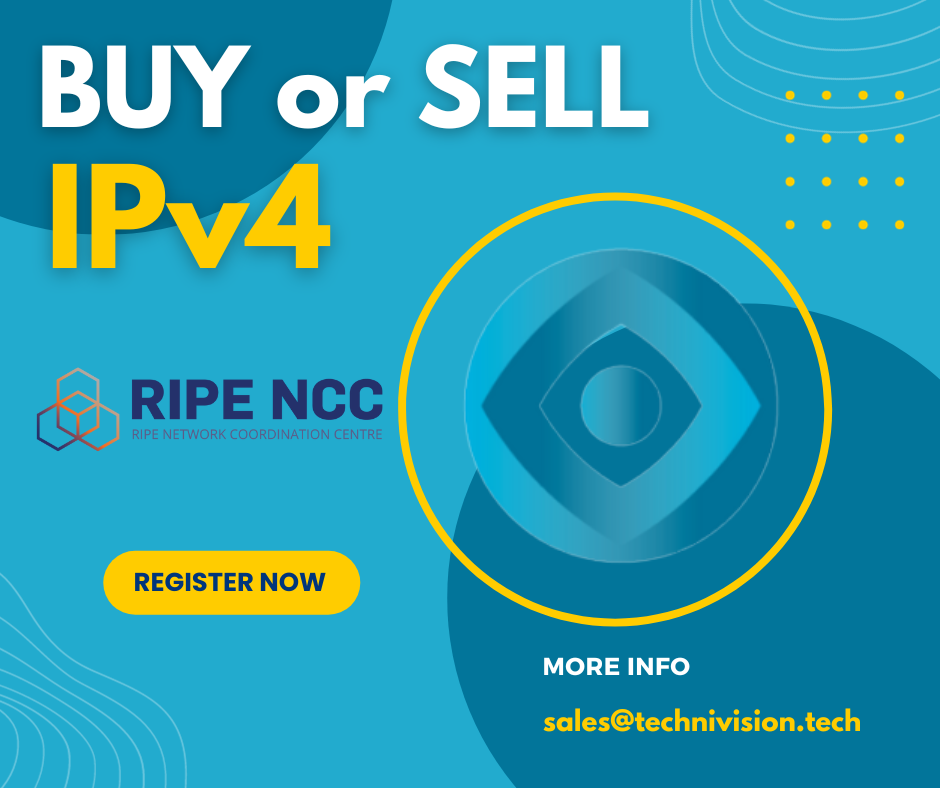Simplifying the process of buying IP addresses

The Role of IPv4 Broker in the IP Address Market
What is the role of an IP address broker? How do they facilitate the buying and selling of IPs? Is it possible to acquire IP resources more quickly and cost-effectively without their assistance? Read on to discover the answers.
As valuable IP addresses become scarce, businesses seek innovative approaches to obtain these resources. Enter IP brokers or traders, offering services to facilitate the sale or purchase of IPv4 addresses. Why? Because an IPv4 broker may present the most favorable terms when dealing with IP addresses.
But what exactly does an IPv4 trader do? How do they contribute to the acquisition of necessary assets? Are there alternative industry players that offer better conditions for obtaining IPv4 addresses? Explore these questions to gain a comprehensive understanding.
What is an IPv4 broker, and what do IP brokerage services offer?
An IPv4 broker serves as a third-party intermediary connecting buyers and sellers in the exchange of IPv4 addresses. Their primary responsibility is to facilitate seamless IPv4 address transfers, ensuring the success of each transaction.
The existence of IPv4 brokerages spans over a decade, emerging with the global exhaustion of the limited address space of 4.29 billion IPs in 2011. Notably, this period marked the initiation of significant IP sales, including Microsoft's acquisition of IPs valued at $7.5 million from Nortel.
Beyond transaction management, an IPv4 broker's role extends further. Let's delve into the specific functions and responsibilities of an IP broker.
Simplifying the process of buying IP addresses
IPv4 brokers optimize the purchase of IPv4 addresses. How? First, they develop strong relationships with Regional Internet Registries (RIRs). More specifically, IPv4 traders facilitate the transfer process by contacting a relevant RIR on behalf of their clients and preparing all the necessary documentation.
This is helpful to most companies that simply do not have the time to communicate with RIRs and analyze the requirements and policies relating to the transfer process. IPv4 agents familiar with the intricacies of an IP transfer procedure can promptly prepare purchase agreements and other documents, thereby saving time for both parties – the seller and the buyer.
Brokers also contact RIRs on behalf of their clients to get the approval that they are eligible to either sell or buy. That is because IP holders may need to verify their holdership of the address space. While buyers may need to justify their need for IPv4 address blocks.
Furthermore, as intermediaries, brokers assist in establishing transparent payment terms and ensuring secure money transfers. As a result, buyers can be sure that their transactions are quick and efficient.

IP brokers facilitate IPv4 selling and buying
Of course, brokers charge buyers and sellers a brokerage fee for each successful commercial transaction. Therefore, the parties involved in the trade should consider additional expenses on top of the actual IPv4 price. The brokerage fee, naturally, varies from firm to firm.
RIR support and verification of IPv4 addresses
IPv4 traders may be able to transfer the IPv4 address space in all five RIRs that provide services in every geographical region of the world:
- AFRINIC – African Network Information Center
- ARIN – American Registry for Internet Numbers
- RIPE NCC – Réseaux IP Européens Network Coordination Center
- LACNIC – Latin America and Caribbean Network Information Center
- APNIC – Asia Pacific Network Information Center
Communication with all RIRs may allow brokers to sell resources from different geographical locations and have partners all over the world. Simultaneously, this allows the registered brokers to analyze the global IPv4 price trends and offer fair prices to clients who may not have the time to perform their own investigations.
Unfortunately, unverified intermediaries operating in the black market may attempt to sell the IPv4 address space at an unreasonable cost. Therefore, buyers may not get the best prices and overpay for the assets. Ultimately, if you wish to sell or buy IPs, make sure you choose a trustworthy broker.
Needless to say, IPv4 addresses must be verified before they are placed on the market. Registered IPv4 brokers utilize IP blocklists to check the IPv4 address blocks put up for sale to ensure that these addresses are clean and ready to be used. This benefits all sellers who may not even be aware that their unused resources could be abused.
IP reputation is equally as important for those who want to buy the resources to scale their networks. The purchasing parties should consider choosing a trader that thoroughly screens IP holders and their resources.

IP address reputation monitoring
Are IPv4 brokers the only players in the industry?
IPv4 brokers facilitate buying and selling the IPv4 address space. However, not everyone knows that there are other options besides buying or selling. IP leasing is a service that enables companies to access the IPv4 addresses they need in a faster and more cost-efficient way.
IPXO – Internet Protocol Exchange Organization – introduces an automated IP lease and monetization platform for businesses from every industry, including hosting, telcos, IoT and cybersecurity. While those with a large inventory of unused IPv4 addresses can put them on the Marketplace for monetization, companies in need of IPs can lease them quickly and fuss-free at competitive prices.
Undeniably, leasing IP addresses is a simpler process compared to transferring IP addresses. Clients can register at the IPXO Portal and start leasing or monetizing almost immediately. Also, leasing is conducted in a completely transparent manner, and there are no hidden fees when joining. Not to mention that you might not even need to contact your region-specific RIR to lease IPs, which surely can save a lot of time.
Besides, the IPXO Marketplace offers the IPv4 address space from all Regional Internet Registries. This means that IP lessees can gain access to a large inventory of IPv4 addresses from any geolocation.
On top of all that, our well-established automated platform helps us efficiently handle millions of IPv4 addresses. For example, automated blocklist scanning helps our highly experienced Abuse Prevention team to ensure that the IPv4 address space is safe to use in any business network.
To sell/buy or to lease: That is the question.
The global depletion of IPv4 addresses has influenced the rise of solutions and services that involve buying and selling IP resources. IPv4 brokers connect businesses from all over the world – those who want to buy IPv4 addresses and those who wish to sell their assets.
But an IPv4 broker only sells and buys IPv4 addresses. On the flip side, companies like IPXO can help lease the IP address space and expand any company’s infrastructure in a cost-efficient and sustainable way.
IP leasing is an easier and quicker process than IP transferring, which allows you to utilize IPv4 addresses on any network almost immediately. If you were to lease, you could utilize IPs in a couple of days, whereas it could take weeks if you chose to buy/sell IPs and transfer the holder’s rights. The best part is that quick provisioning is just one among the benefits of IP leasing.
Do you have dormant assets to spare? Join the IPXO Marketplace, lease IPs and unlock a new revenue stream. Perhaps you need IPs to scale? The Marketplace can offer the freedom to expand your business quickly at a low upfront cost.
If you are interested in the leasing or monetization process, contact us, and our team will answer all of your questions.






